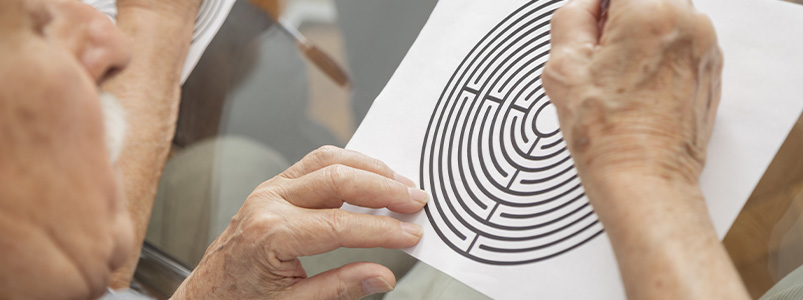Many interventions can be beneficial for older people in residential homes
SBU has undertaken a quality review and commented on six well-designed international systematic reviews on various interventions aimed at older people with dementia and who live in special housing. The results show that several interventions effectively improve quality of life. Although the interventions have no known adverse effects, individual assessment is important since no single intervention is appropriate in all cases.

Robotic pets may benefit health and well-being
Therapy involving live animals may increase well-being and decrease men- tal ill health in the elderly. The research
results that we reviewed demonstrate that robotic animals can also have the same effects, especially in those with dementia. The elderly, staff and family members describe how robotic animals contribute to various aspects of well-being, such as reduced loneliness and increased social interaction. The results apply to those who choose to interact with the robotic animal. Not everyone has a positive experience with them. It is important to assume an individualized approach and use them as a complement to traditional care services.
Improved quality of life from indoor nature-based interventions
Indoor nature-based interventions involving active participation benefit the health and well-being of the elderly with dementia in a similar way as being out in nature. The interventions may also have a beneficial effect on mental and social well-being, involvement and quality of life.
However, it is important for older people to be actively involved. Examples include planting or caring for potted plants. In this approach, residents should also take responsibility for the plants.
Non-pharmacological treatment for depression at least as effective as drugs
Many patients suffering from dementia are depressed. One common treatment for depression is antidepressants, which often have side effects. Non-pharmacological treatments are equally or more effective than drug treatment in reducing the symptoms of depression. Such treatments include physical exercise, massage, touch therapy and cognitive stimulation.
These results are applicable for mild to moderate depression. For major depression, the scientific support is unclear. The results are based on a network meta-analysis and should be interpreted with some caution.
Cognitive training can have a beneficial effect on dementia
Dementia-related cognitive impairments cannot be reversed. But efforts can be aimed at slowing progression of cognitive decline. Cognitive training is a term used to describe an array of techniques used to stimulate and train functions such as information processing, problem-solving and memory. The training likely has a small to moderate effect on general cognition among individuals with mild to moderate dementia.
Music therapy can reduce symptoms of depression
Music is used in various ways within healthcare and social services for people with dementia. The review by SBU shows that music-based therapeutic interventions provided by a qualified music therapist are likely to reduce depressive symptoms and behavioral problems in people with dementia who are hospitalized or live in long-term care facilities.
Physical exercise reduces the risk of falls
The proportion of individuals who fall increases with both advancing age and worsening health, and is also higher among those living in long-term care facilities or who are hospitalized. Physical exercise can reduce the number of falls by about 25%. Such programs are most effective if led by health professionals. The programs are effective regardless of whether the participants are at high or normal risk of falling and whether they are younger or older than age 75.
About the commentaries
SBU reviews the quality of systematic reviews by outside researchers and comments on them from a Swedish perspective. We call this type of compilation “SBU Commentary.”
SBU considers all six reviews to be well done, which means that the risk that the results have become skewed during the studies is low. However, SBU has not assessed the risk of bias in individual studies included in the reviews.
- The role of robotic animals in the health and well-being of older people with dementia in special housing. SBU, 2022. www.sbu.se/2022_02
- Nature-based indoor interventions in residential homes to improve the health and well-being of the elderly. SBU, 2022. www.sbu.se/2022_01
- Treatment of depression in people with dementia. SBU, 2022. www.sbu.se/2022_04
- Cognitive training for people with mild to moderate dementia. SBU, 2022. www.sbu.se/2022_03
- Music-based therapeutic interventions for people with dementia. SBU, 2020. www.sbu.se/2020_02
- Physical exercise to reduce the risk of falls in the elderly. SBU, 2021. www.sbu.se/2021_05

 Swedish Agency for Health Technology Assessment and Assessment of Social Services
Swedish Agency for Health Technology Assessment and Assessment of Social Services
 Share on Facebook
Share on Facebook
 Share on LinkedIn
Share on LinkedIn
 Share via Email
Share via Email